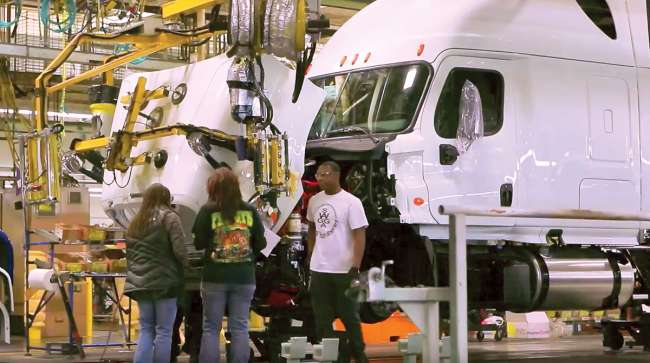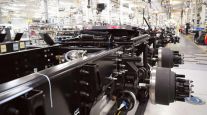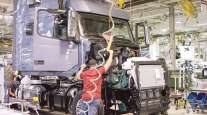Senior Reporter
June Class 8 Orders Hold Their Own Amid Larger Flux

[Stay on top of transportation news: Get TTNews in your inbox.]
North American Class 8 orders for June came in at 15,500 and pointed to truck makers doing their best to accommodate ongoing strong demand that already has pushed out the backlog to 7.6 months, ACT Research reported, citing truck makers’ preliminary data.
A year earlier, orders totaled 25,824, according to ACT.
“Demand is holding up, but the industry’s inability to meet that demand is still confounding everything,” ACT Vice President Steve Tam said, noting a chronically challenged supply chain, coronavirus mutations, inflation and the war in Ukraine.
Despite broader macro uncertainty about Russia/Ukraine, China, interest rates, and potential recession, the prevailing theme in Class 8 remains exceedingly durable...https://t.co/jaelrtpHK8#truck #semitruck #trucking #transportation, #Class8, #ACT, #ACTResearch pic.twitter.com/V1Q0JGILDZ — ACT Research (@actresearch) July 7, 2022
For the first six months, orders straggled in at 109,222 compared with 208,795 a year earlier, according to ACT.
At a time when so many parts of the freight and equipment market are shifting at once, it can be hard to find a stable metric to assess the situation. Tam chose seasonality — or the predictable fluctuations in a given month compared with the average over the years — as one way to put orders in perspective.

Tam
“What seasonality is trying to explain, allegedly, are known differences, if you will, from normal; so you then dig a little bit deeper into the underlying factors what’s going on,” he said.
ACT reported the seasonally adjusted level for June was 18,300, and very close to the adjusted average of 18,500 for January through May.
“Even though the economy and the shape of freight has changed, [fleets’] mind-set and processes have not,” he said. “You still get this pretty distinctive seasonal pattern.”
FTR pegged preliminary orders at 15,000.

Roth
“I don’t think the June number is a negative, and it is about in line with where we should be given current production rates and backlog,” said Charles Roth, commercial vehicles analyst for FTR.
“All things considered, it could be far worse,” Roth said. “I think the fact that truck makers are still willing to take on any additional orders, regardless of build time, I think that is a positive.”
He expected large fleets’ replacement demand heading into 2023 “as long as we don’t see a significant enough recession the likes of the Great Recession in 2008, should be enough to carry the Class 8 industry.”
For the near term, he said until materials pricing and lead times for 2023 are locked down and committed, there is downside potential to orders.
“And I wouldn’t be surprised if we see the orders drop off from where they are,” Roth said.

Costello
Bob Costello, chief economist for American Trucking Associations, agreed there is a lot of pent-up demand for new trucks.
“Lack of supply over the last couple of years means that there is a significant amount of replacement demand. I don’t think that new truck demand changes significantly in the near term,” Costello said, “but I also don’t believe the supply situation changes significantly in the near term, either.”
There is a silver lining to the current situation, Daimler Truck Chairman Martin Daum, whose North American subsidiary is the Class 8 market leader, said in late June.

Daum
“[Daimler has] an extraordinarily high, not to say record-breaking, order backlog,” Daum said. “Our stock of unfinished trucks is also high. These are vehicles built to customer order for which important parts are still missing.”
He said Daimler was confident it will be able to deliver these unfinished vehicles by the end of the year.
“Both inventory items [backlog and undelivered] form a cushion which will give us the best possible basis for further growth in the coming quarters,” Daum said, and would soften the effect of a moderate economic downturn if that occurred.
“We have recently delivered fewer vehicles to our customers then they actually wanted to buy,” he said. “As a result, those customers are so far behind in their fleet renewals that they now urgently need and want new trucks. They can no longer postpone new purchases. We therefore do not observe any order cancellations.”

3PL problem-solvers discuss the supply chain and how they use technology to improve their customer competitiveness. Tune in above or by going to RoadSigns.TTNews.com.
Meanwhile, all of the six biggest U.S. manufacturing industries registered moderate to strong growth in June — computer and electronic products, machinery, transportation equipment, petroleum and coal products, food, beverage and tobacco products, and chemical products — Timothy Fiore, chair of the Institute for Supply Management manufacturing business survey committee, wrote in a recent report.
At the same time, the Manufacturing Purchasing Managers’ Index (PMI) for June registered 53%, down 3.1 percentage points from the reading of 56.1% in May.
“This figure indicates expansion in the overall economy for the 25th month in a row after a contraction in April and May 2020,” Fiore wrote. “This is the lowest Manufacturing PMI reading since June 2020, when it registered 52.4%.”
Want more news? Listen to today's daily briefing below or go here for more info:




